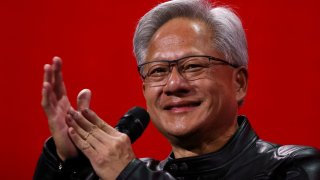- Nvidia CEO Jensen Huang praised China’s AI models a day after the U.S. chipmaker said it expected to resume sales of a key product to China.
- “More than 1.5 million developers in China build on Nvidia today to bring their innovations to life,” he said.
- He was speaking Wednesday at the opening ceremony of a supply chain expo in Beijing and is scheduled to hold a press conference later in the day.
BEIJING —
Nvidia
CEO Jensen Huang praised China’s generative artificial intelligence models, a day after the U.S. chipmaker said it expected to resume sales of a key AI chip to the country soon.
Stream San Diego News for free, 24/7, wherever you are with NBC 7.
“Models like DeepSeek,
Alibaba
,
Tencent
, MiniMax, and
Baidu
Ernie bot are world class, developed here and shared openly [and] have spurred AI developments worldwide,” Huang said. He was speaking Wednesday at the opening ceremony of a supply chain expo in Beijing. He is scheduled to hold a press conference later in the day.
“More than 1.5 million developers in China build on Nvidia today to bring their innovations to life,” he said.
Get top local San Diego stories delivered to you every morning with our News Headlines newsletter.
China-developed DeepSeek shocked global investors in January with an AI model that undercut OpenAI on development and operating costs. It’s not clear how DeepSeek managed to develop the model under broad U.S. chip restrictions on China, but the startup’s parent, High-Flyer,
reportedly stockpiled Nvidia chips
.
Nvidia on Tuesday said it
expected to resume its H20 chip shipments to China soon
following assurances from the U.S. government. The company was forced to halt the sales in April due to new U.S. requirements at the time.
Money Report
CNBC’s UK Exchange newsletter: Britain was once known as a ‘nation of shopkeepers.’ Now, not so much
Chip giant ASML says it can’t confirm that it will grow in 2026
U.S. chip restrictions
nearly halved
Nvidia’s share in China, Huang said in May. Due to the U.S. export controls on China, the company said it missed out on $2.5 billion in sales during the April quarter, and
will likely take another $8 billion hit
in the July quarter, pegging its quarterly sales at $45 billion.
Huang has warned that Chinese telecoms giant
Huawei stands to benefit from
U.S. AI chip curbs on exports to the Asian country.
Jensen is on his third trip to China this year, according to
reports going back to January
.
In the global race for AI, Chinese companies Alibaba, Tencent and Baidu have all rushed to release their own AI models despite limited access to training chips. OpenAI’s ChatGPT chatbot is also not officially available in China.
Huang on Wednesday also praised Chinese companies for taking an
open-source approach to AI,
meaning developers can access the underlying code for free. Notably OpenAI in the U.S. has not yet taken this approach. Alibaba-backed startup Moonshot last week released a new open source model called
Kimi K2
that claims to beat OpenAI’s ChatGPT and Anthropic’s Claude on certain coding metrics.
“China’s open-source AI is a catalyst for global progress, giving every country and industry a chance to join the AI revolution,” Huang said. He added that open-source technology is also “key” for AI safety and enables international cooperation on standards.
Huang also described how AI “powers” Chinese consumer tech such as Tencent’s WeChat social media app, Alibaba’s Taobao shopping app, ByteDance’s Douyin short-video app and Meituan’s “super convenient” delivery.
The latest U.S. government restrictions on Nvidia had followed tighter export controls over the last three years that prevent American companies from selling advanced semiconductors to China over concerns that the tech will support the development of Beijing’s defense sectors.
Huang has
pushed back against concerns
that China’s military would use U.S. technology, and emphasized global access was needed for the country to remain a world leader in AI, according to an
interview
with CNN that aired Sunday.
Following U.S.-China trade talks in London last month, the U.S. has started to ease some restrictions on high tech exports to China, while Beijing has resumed some issuance of licenses that allow its companies to export critically needed rare earths to the U.S.
– CNBC’s Dylan Butts contributed to this report.
Also on CNBC
-
AMD to resume MI308 AI chip exports to China
-
It’s refreshing to see tariffs used as a weapon for peace
-
Nvidia says it will resume H20 AI chip sales to China ‘soon,’ following U.S. government assurances







